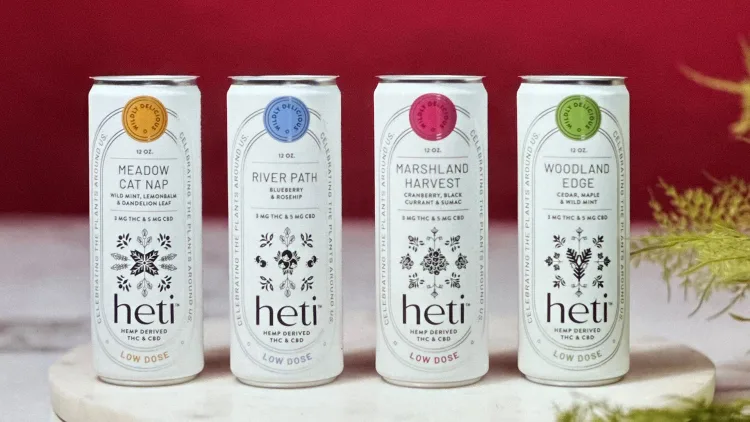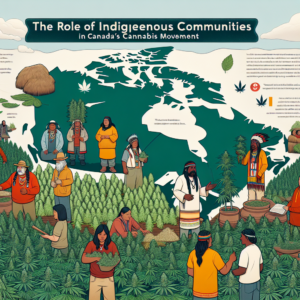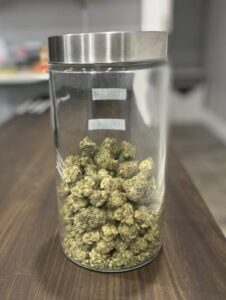Dana Thompson, who was part of the team behind the James Beard Award-winning restaurant Owamni, has a new focus: beverages.
From Fast Company by Anna Louise Jackson may 8 2024
Dana Thompson has spent much of the past decade thinking about food—be it advocating for food sovereignty or as cofounder of Minneapolis-based Owamni, which won the James Beard Award for best new restaurant in 2022. Now, she’s turned her attention to beverages, with a new line of low-dose THC/CBD cannabis seltzers called Heti.
As with her work in food, Thompson is embracing her Indigenous ancestry and incorporating ingredients native to North America. The seltzers come in four flavors infused with the likes of cranberry, sumac, dandelion, cedar, rose hip, wild mint, and black currant, and naturally sweetened with honey, maple, and agave.
With the recent launch of Heti, Thompson is also entering a fast-growing segment of the cannabis industry. While beverages only represent 1% of total legal cannabis sales across markets tracked by BDSA, it’s a segment with “big potential” and the market researcher forecasted this segment would reach $200 million last year.

As fast as the industry is growing, it’s also changing. Minnesota, where Thompson is based, legalized recreational marijuana in August 2023 and keeping up with changes across the country is challenging—as is navigating an “incredibly complex” industry, Thompson says. “Learning this new business has been literally like drinking from a fire hose,” she tells Fast Company.
Promoting health and community are core tenants of Heti, Thompson says. Although cannabis isn’t native to North America, she says the plant has Indigenous resiliency and the beverages are packed with electrolytes, antioxidants, vitamin C, and flavonoids. The drinks are currently priced at $27 for a four-pack, and Thompson is working to bring down that number down and make the product more broadly accessible. She’s also dreamed up some food pairings with her partner chef from another business, The Modern Indigenous.
With Heti, the experience of building the business as a solopreneur with carte blanche has been “the delight of a lifetime,” says Thompson, who is a descendant of the Sisseton-Wahpeton and Mdewakanton Dakota tribes. The company is also an opportunity to pay homage to and honor her ancestors. Heti means “home” in the Dakota language, which is fitting for its social mission: The company will donate a percentage of revenue to help develop sustainable housing for Indigenous communities using hempcrete, which is a bio-composite made from hemp.
Thompson chatted with Fast Company about the launch of Heti. (The transcript has been lightly edited for clarity.)
You stepped away from The Sioux Chef and Owamni and NATIFS last year. What are you up to these days?
When cannabis was legalized in the state of Minnesota, I started researching and figuring out what it would take to get a beverage brand launched.
I believe that there was a void in the marketplace. As I was seeing some of the THC beverages launch—which I am a fan of myself—I found them to be too sugar-heavy. If it was a flavor profile that I enjoyed, I wanted to be able to taste all of those flavors.
So I spent months working with a team and formulating these four gorgeous flavors and have created Heti. And each flavor is designed to transport you to a place in nature.
Is a goal to get Heti into restaurants eventually?
I think that is a possibility. So much of it depends on how this first year goes with Heti, how my distributor relationships go, and which states I decide to take on.
It’s just a really crazy time, and I think that the dial is going to be moving in the right direction. People are getting real pain relief from a variety of different cannabis uses, and I think as people unlearn the toxicity of what was “the war on drugs”—that this is truly plant medicine—that it will continue to evolve. That’s my hope anyway.
I want to get this beverage into the hands of elders, specifically, because the 5 milligrams of CBD and the 3 milligrams of THC is really a replacement for wine and people are trying to get away from alcohol right now.
Do you think there’s been an evolution, in terms of the market for Indigenous-owned brands, that’s perhaps set you up for a different level of success than in the past?
I do. And it’s been extraordinary to get emails from tribes all over the country that are so excited about this and wanting to partner and wanting to lift women-owned businesses up.
I think it’s a time for innovation and leveling up community. And especially in tribal communities, there’s a lot of seeking to replace alcohol in their communities, and this is something that’s going to work for them.
It’s been resonating with the tribes. Some of the casinos are saying that they can’t take it in because of some federal laws, some are saying, “Send us 20 cases.”
Where are the drinks available now?
I am self-distributing right now as I’m negotiating with distributing teams. And we’ve been doing really well in the Twin Cities. [The seltzers are] in several liquor stores, they’re in several restaurants, and we’re working on getting into Total Wine, which is going to be huge for us.
In Minnesota, it’s wild because you can sell these in liquor stores, grocery stores, convenience stores, gift shops, and there’s a lot of nonalcoholic bottle shops that are popping up.
What do you hope that consumers will take away from the brand? What’s your bigger goal?
Every time I work within the Indigenous space, I think of it as a fight against white supremacy. Because Indigenous people are still here. We have amazing communities with incredible talent and resiliency and so much ancestral knowledge of the area genetically within us. I think that helping people understand their relationships with the plants around us is also really important because the more plant relatives that you can name and have relationships with, the happier we are as humans. I truly believe that.










Comments are closed.